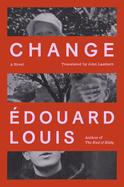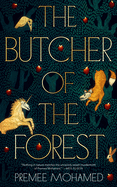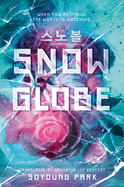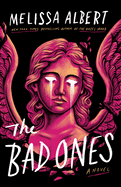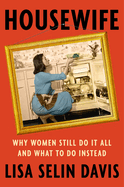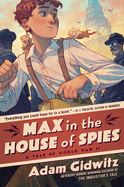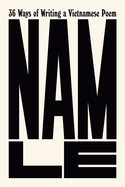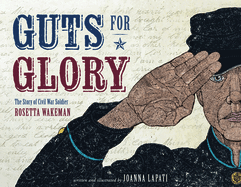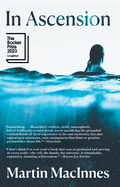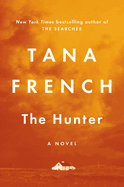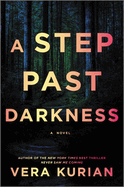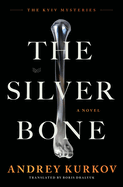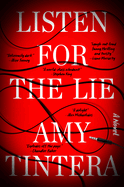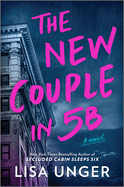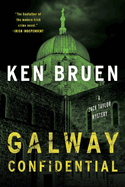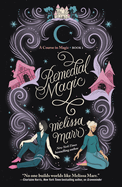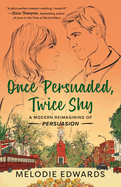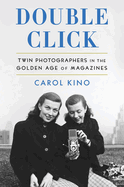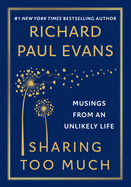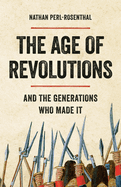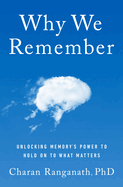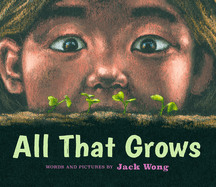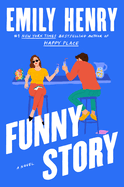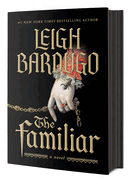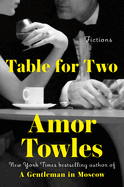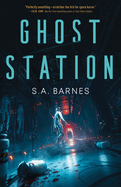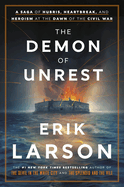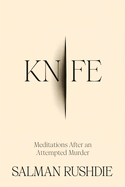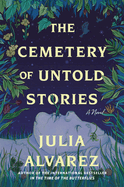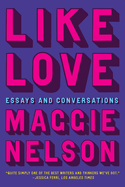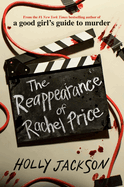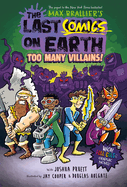Friday, March 8, 2024
Among the stellar books featured in today's issue, we look at Housewife: Why Women Still Do It All and What to Do Instead by Lisa Selin Davis, "a clear-eyed cultural appraisal of 'women's work,' and the high price women pay as working mothers"; as well as Listen for the Lie by Amy Tintera, which follows a podcast's murder investigation in a small town "with dark humor, propulsive pacing, and a properly confounding whodunit." Plus, Snowglobe by Soyoung Park, an "austere, thrilling, and endlessly surprising YA dystopian novel," grapples with the obsession with fame on a frozen future Earth.
In The Writer's Life, Jessica J. Lee discusses the difference between writing a picture book like A Garden Called Home for children versus writing her other books for older readers.
Change
by Édouard Louis, transl. by John Lambert
Americans haven't cornered the market on reinventing themselves, as Édouard Louis (History of Violence), a French writer whose fiction blends the political and sociological, demonstrates with poetic, edgy charm in his autobiographical novel Change, translated by John Lambert. Born Eddy Bellegueule in the French countryside, Louis "grew up in a world that rejected everything I was." In an opening section addressed to his father, he describes his determination to escape, to become rich and powerful as "revenge against you and the world that had rejected me." When he's 14 he moves to Amiens, a city his father hated "because of the foreigners," to study theater. At school, he befriends classmate Elena, who comes from a family unlike his, with a cultured home that has "thousands of books, an antique piano, reproductions of paintings on the walls." Louis concludes: "This is the life I want to live."
So begins his transformation into Édouard, which he recounts in elegant chapters that chronicle his painful attempts at becoming a writer. These involve his eventual dissatisfaction with Amiens; his desire to move to Paris; his coming to terms with his homosexuality; the many men he sleeps with, some solely for money; and the others, from famous writers to the president of a bank, who mentor him. If Louis has covered some of this terrain before, the return is welcome. Anyone who has ever felt unseen will understand what he means when he writes of "the beautiful violence of being torn away, of having a chance at freedom" and will savor this candid novel. --Michael Magras, freelance book reviewer
Discover: Change is Édouard Louis's autobiographical novel about his escape from childhood poverty, reinvention as an intellectual and writer in Paris, and coming to terms with his homosexuality.
American Spirits
by Russell Banks
Some of the sharpest criticisms about the ethos of the United States can be found in American Spirits, the final work of short fiction by Russell Banks (A Permanent Member of the Family; Lost Memory of Skin), who died in 2023. The three stories in this collection are a wallop to the psyche of the country, with plenty of censure to go around. There's plenty of provocation, too: the protagonists of these works are unapologetic Trump supporters. As in other Banks works, the setting is Sam Dent, "hometown for eleven hundred disparate souls" in upstate New York. Conflicts don't resolve pleasantly, nor does Banks spare his characters, including children, from the worst of life.
Each story is a model of grotesque beauty. In "Nowhere Man," a hunter who hates "socialist Democrats" sees no contradiction between his passion for hunting and his hatred of a wealthy out-of-stater who sets up a shooting range on the property the protagonist's family sold him. "Homeschooling" pits a conservative couple against the married white lesbians who live next door with four adopted Black children, a conflict that intensifies when the children seek their neighbors' help. The finale, "Kidnapped," centers on two Canadian drug dealers who abduct the grandparents of a 20-year-old who has the cocaine the young man's mother was supposed to sell. Parts of this collection have a both-sides element that might rankle, but Banks had storytelling muscle to spare. Anyone keen to discover why Banks was one of the most celebrated writers of his day will find ample evidence in these brutal, propulsive works. --Michael Magras, freelance book reviewer
Discover: This posthumous collection of short works by Russell Banks features three grotesquely beautiful tales of brutality and distrust set in the fictional town of Sam Dent in upstate New York.
In Ascension
by Martin MacInnes
It's a rare joy to find such raw feelings of awe conveyed through several hundred pages. In Ascension by Martin MacInnes (Infinite Ground) explores several mysteries: the origins of life, whether humans are alone in the universe, and the fraught complexities of family. Longlisted for the 2023 Booker Prize, it delivers both satisfying, well-researched scientific information and a complex narrative.
Leigh is a marine biologist who's fascinated with ancient underwater organisms. She's called to help investigate a confounding, newly discovered marine trench which appears to be deeper than the Mariana Trench. A series of strange events occur during the deep-sea exploration, leading to further curious phenomena that, somehow, seem connected. Through it all, Leigh struggles with her duty to her family and a desire to escape entirely into her work. Still, her family shadows her--no matter how far she runs.
MacInnes beautifully renders the sea and sky as thought-provoking parallels. "I swam in the small cove near the guest-house last thing in the evenings, diving and playing in the stringy white surf, watching the stars become clearer each night as the moon waned.... I imagined a life of this, in close contact, as I saw it, with the stuff of the world." Readers experience Leigh's transcendent relationship with the sea and sky, and are brought with her into closer communion with wonder through her attention and openness to awe-inspiring nature. MacInnes's evocative writing serves as a profound meditation on science, the human condition, and what it means to be alive. --Carol Caley, writer
Discover: Martin MacInnes delivers a beautifully written story of science, family, and the origins of life.
Mystery & Thriller
The Hunter
by Tana French
In The Hunter, Tana French (The Searcher; The Witch Elm; The Trespasser), building on the success of eight previous novels, delivers the mystery, atmosphere, and feeling her fans have come to expect.
Following the events of The Searcher, French takes her readers back to the tiny Irish townland of Ardnakelty, where former Chicago Police Department detective Cal Hooper has settled to live a quiet, scenic life and repair furniture. He's already gotten more than he signed up for, including a lovely, levelheaded girlfriend named Lena; a surrogate teenaged daughter, Trey; and a place in the local social circles (and the pub). But when Trey's long-absent father resurfaces with a get-rich-quick scheme, he threatens the equilibrium of various village relationships, including those Cal holds most dear.
French is at her best in this novel, showcasing its sharp, scintillating sense of place (Ardnakelty is a character unto itself) and powerful mood of foreboding and that of secrets deeply held. Cal Hooper can be likened to a old western hero, with his staunch personal code; he equally recalls a hard-boiled detective: he's retired but, despite best efforts, he's not done investigating. The father-daughter dynamic so delicately established between Cal and Trey--who share no blood and met only two years ago in the previous novel--is heart-wrenching, gorgeously written, and under threat.
French has never shied away from weighty themes, and here her protagonists wrestle with vulnerability, revenge, and the danger of letting the past determine the future. The Hunter is perhaps her finest work--and leaves readers thirsty for more of Cal's story. --Julia Kastner, librarian and blogger at pagesofjulia
Discover: Tana French is at her best with this character-focused sequel to The Searcher, featuring humor, angst, pathos, and mystery in a tiny Irish village.
A Step Past Darkness
by Vera Kurian
A murder reunites a group of former classmates who witnessed a terrible crime 20 years earlier in A Step Past Darkness, a twisty supernatural thriller by Vera Kurian (Never Saw Me Coming).
In 2015, Jia Kwon receives a phone call from Sheriff Zachary "Blub" Springsteen in her hometown of Wesley Falls, Pa. Jia sometimes has visions, and Blub, a former classmate, had called her last winter to find a woman who had wandered off from the local nursing home. Now he's asking about another missing person, and the body she leads him to turns out to be another classmate, Maddy Wesley. Twenty years earlier, Jia, Maddy, and four other classmates witnessed a violent attack in the town's abandoned coal mine, beginning a series of events that led to one of them fleeing town and the rest breaking off contact. But now Jia believes a secret that they kept about the leader of the local mega-church led to Maddy's death, and the remaining five of them are the only ones who can discover why.
In her sophomore novel, Kurian expertly interweaves two story lines--gradually and suspensefully revealing what the protagonists, as teenagers in 1995, discovered about the church that dominated social life in their small town, alongside the disturbing revelations that occur in 2015. The heterogeneous crew thrown together for a school project and bonded by their ordeal makes for an appealing team. Thriller fans will be eager to see what Kurian delivers next. --Kristen Allen-Vogel, information services librarian at Dayton Metro Library
Discover: A murder in a small town forces a reunion of six friends to confront an evil they first witnessed as teenagers 20 years before.
The Silver Bone
by Andrey Kurkov, transl. by Boris Dralyuk
The Silver Bone, a smart magical-realistic thriller written by Andrey Kurkov (The Case of the General's Thumb) and translated from the Russian by Boris Dralyuk, is set in Ukraine after World War I. A father and son on an errand become entangled in a riot between looters and the military. The incident transforms the shy youth into a hardscrabble detective.
Ukraine's government has fallen, and lawlessness has spread throughout the country. During the riot, a marauding Cossack kills Samson Kolechko's father and slices off Samson's right ear. A doctor bandages the wound, but the ear cannot be reattached. The suddenly orphaned boy keeps it and stores it in his father's office.
A pair of soldiers soon arrive at Samson's door with a military proclamation stating all single occupants are required to provide soldiers with housing. They commandeer his father's office as their sleeping quarters. One night, while in another room, Samson can hear via his severed ear his unwanted houseguests plotting to steal riches from the town and escape Kyiv for a nonmilitary life elsewhere. Killing Samson would ensure their clean getaway.
When a distraught Samson rushes to the still-forming police department and files a written complaint, the head constable is impressed by Samson's intellect and offers him a detective position on the spot. The hapless youth accepts and sets about thwarting the criminal activity plaguing his town's survival. Samson's steadfast belief in the truth and his incorruptible sense of right and wrong are laudable, but in this first installment of a new series, the real magic lies in this orphan's ability to survive. --Paul Dinh-McCrillis, freelance reviewer
Discover: Magical realism melds seamlessly with mystery in this story of the death of a young student's father, which sparks the boy's transformation into a detective working in Ukraine after World War I.
Listen for the Lie
by Amy Tintera
With Listen for the Lie, Amy Tintera (Reboot; The Q) offers a sexy, compelling mystery as her adult debut. Entertaining characters act out the intrigues of murder and of small-town life, with dark humor, propulsive pacing, and a properly confounding whodunit.
Lucy Chase has been living a not-particularly-successful life in Los Angeles. When the novel opens, she has just been outed by a true-crime podcast as the overwhelmingly favored suspect in the murder of her best friend five years earlier, in the small Texas town where they both grew up. Now that she's been fired from her job and her boyfriend is trying to break up with her, she lets her grandmother (her last friend and defender in the world, it seems) talk her into coming home for a visit.
Back in Plumpton, Tex., she immediately runs into Ben Owens, the true-crime podcaster who's on his way to ruining her life. He is obnoxiously sexy, and perhaps less out to get her than she'd originally thought, but Lucy's hometown offers her no comforts. The circumstantial evidence is damning, but Ben is able, with amateur detective work, to expose enough secrets to complicate the case considerably. Lucy is as surprised as anyone.
The murder suspect's amnesia throws a wrench in readers' ability to guess at Tintera's plot twists. Plumpton is a thoroughly realized setting, complete with neighborhood personalities and an authentic small-town dynamic. Listen for the Lie is quite sexy, compulsively readable, and laugh-out-loud funny, and Tintera has left herself healthy room for a sequel. --Julia Kastner, librarian and blogger at pagesofjulia
Discover: Small-town dramas, sharp humor, strong characters, and a touch of romance spice up a genuinely fun mystery.
The New Couple in 5B
by Lisa Unger
There's something about Manhattan apartment buildings that demands to be the setting for psychological thrillers. Among such novels, there's Rosemary's Baby, SWF Seeks Same, Must Read Well, and now Lisa Unger's The New Couple in 5B, an exemplar of this seductive subgenre.
The novel is narrated by Rosie Lowan, a writer working on a follow-up to her successful true-crime debut. Her next book will be about the Windermere, a Park Avenue apartment building with a macabre past. Rosie got to know the Windermere through one of its residents: Ivan, her floundering-actor husband Chad's ailing uncle. After Ivan dies, Rosie learns that he has willed the couple his unit, which surprises her, as she recalls Ivan saying that the property would be going to his estranged daughter. Also curious: when Rosie is exploring the Windermere's basement, she has an encounter that tests her resolve not to believe in ghosts.
Despite the novel's occult preoccupations, Unger (Confessions on the 7:45; Last Girl Ghosted) makes the story work for readers who like their mysteries to follow the rules of logic. A parallel narrative set in 1963 will have readers one step ahead of Rosie at times, but anticipating when and how she'll see the light is irresistible enticement to turn pages. At one point, Rosie and her editor "fork fight" over a shared tiramisu, and reading The New Couple in 5B is like tucking into a rich dessert: it's dark and intense but goes down so easy that one is disinclined to stop. --Nell Beram, author and freelance writer
Discover: Centered on a couple who inherit a unit in a storied New York apartment building, this seductive psychological thriller follows the rules of logic but has decidedly occult preoccupations.
Galway Confidential
by Ken Bruen
In Galway Confidential, the hard-hitting 17th novel in the brilliant Jack Taylor mystery series by Ken Bruen (Green Hell; Purgatory; Headstone), private detective Jack Taylor wakes from a coma to find someone posing as his brother at his bedside and an ex-nun begging for his help.
Eighteen months have passed since private detective Jack Taylor was stabbed on a bridge and ended up in a coma. The doctor who treated Jack while he was unconscious is dumbstruck when his newly revived patient chooses a gulp of Irish moonshine as the best course of action upon waking. But Jack is a local legend in Galway, Ireland, and never one for taking good advice. Raftery, the person plying the detective with drink, claims to have saved Jack by tossing his attacker off the aforementioned bridge and has managed to convince hospital staff he is Jack's brother. In return for his heroics, Raftery wants to partner up and solve cases. Jack thinks Raftery mysterious--but harmless. Meanwhile an ex-nun hires Jack to stop whoever is randomly killing nuns. Another client needs Jack to catch the two teens roaming the streets burning homeless people. Galway's favorite Jameson-drinking crime-solver is barely out of hospital from almost dying and immediately puts himself right back into danger. Because it is exactly what people expect from the private investigator.
Like his main character's favorite whiskey, Ken Bruen's strong prose demands savoring. The abundance of brutality in his stories is matched with such wit that it's impossible for readers to avoid becoming blissfully intoxicated. --Paul Dinh-McCrillis, freelance reviewer
Discover: Irish detective Jack Taylor is back on the streets, fighting the good fight in the 17th installment of the series, which demands to be savored.
Science Fiction & Fantasy
The Butcher of the Forest
by Premee Mohamed
A woman forced into heroism races against time and sinister magical forces to save her family in the perfectly paced and deliciously threatening dark fantasy novella The Butcher of the Forest by World Fantasy Award winner Premee Mohamed (And What Can We Offer You Tonight).
"It was not yet dawn when they came for her," the story begins, setting an ominous tone that only intensifies as men drag villager Veris Thorn before the Tyrant, her realm's merciless conqueror. His two children have vanished into the Elmever, a parallel magic world that invisibly opens from a nearby wood, and he has heard that only Veris has ever brought a child back from it alive. He orders her to retrieve his children or "your village will be razed... and we will roast your people alive... and eat them." Veris slips into the Elmever with only three tokens to guide her and a single day to retrieve the children. She must face poisonous magic; half-rotted undead beasts bent on devouring her; and elder beings who want her deepest self, all to save the children who will one day oppress her people in place of the Tyrant--if Veris can bring them out in one piece.
Mohamed puts a chilling twist on the fairy tale of the stolen child. Veris, a commoner in her late 30s with little power beyond her wits and experience, makes for a captivating heroine whose vulnerability and fear give the narrative the gasping tension of a horror movie. Butcher of the Forest is short, sharp fantasy at its finest. --Jaclyn Fulwood, blogger at Infinite Reads
Discover: A village woman must rescue two children from a brutal magical wood in this ominous, fast-moving dark fantasy novella.
Remedial Magic
by Melissa Marr
Remedial Magic, the first entry in a projected series by Melissa Marr (Wicked Lovely), is an enthralling novel about safety, power, and love, driven by the characters' intense emotions. The story builds slowly as relationships deepen and mysteries unfurl, allowing readers to sink into the city of witches made almost tangible by Marr's phenomenal world-building.
Ellie, Maggie, and Dan each narrowly escape death by using magic they didn't even know they had. They wind up in Crenshaw, a hamlet for witches to live tucked away from the barbaric world where they're hunted and killed. Dan is happy to escape dying from cancer and to stay in Crenshaw with the sexy Viking-looking man who seems to actually like him. But staying isn't as easy a decision for Ellie, who cares for an elderly aunt, and for Maggie, whose son is at the mercy of his abusive father. Things get complicated when Ellie falls in love with Prospero, a Victorian witch who is definitely keeping secrets but is also wounded and vulnerable. Maggie falls for Sondre, who is definitely not a good guy but is also attentive and caring. On top of that, witches are dying as a side effect of dangerous tactics that some have employed in the dispute over staying in Crenshaw versus rejoining the unmagical world, and a prophecy names Ellie as the key to setting things right. As the witches try to balance obligations to self, family, and society, moral convictions are tested to near breaking point.
With complex characters and beautifully written love scenes, this romantasy will leave readers breathlessly waiting for the next installment. --Dainy Bernstein, postdoc in children's literature, University of Illinois Urbana-Champaign
Discover: Simultaneously dark and cozy, this romantasy is filled with morally gray characters, heartwarming queer love, fatal witches' quarrels, and an exploration of love and trust.
Romance
Once Persuaded, Twice Shy: A Modern Reimagining of 'Persuasion'
by Melodie Edwards
Melodie Edwards (Jane & Edward) presents a wonderfully modern interpretation of Jane Austen's Persuasion in Once Persuaded, Twice Shy. Anne Elliot is the executive director of the Elysian Theatre in the tourist town of Niagara-on-the-Lake, one of Canada's favorite spots to enjoy historical reenactments and water sports. Ever since the death of her mother, Anne has helped provide for her self-indulgent father and clueless sister, while running the theater and trying to forget Ben Wentworth, her love from her youth.
But when Ben's aunt and uncle buy Kellynch, the winery Anne's family used to own before her father spent all their money, Anne's past comes back to haunt her. It's been eight years, but as soon as Ben reappears in Niagara-on-the-Lake, she remembers exactly why she fell for him the first time: "His brow slightly furrowed, that adorable furrow between his brows she used to like to smooth away." As her father's drinking problem worsens and the autumn theater festival gets complicated by fighting actors and a surprisingly violent goose who keeps invading rehearsals, Anne finds herself turning to handsome, helpful Ben multiple times, much to her chagrin.
Edwards beautifully captures the angst and nostalgia of reacquainting with a lost love, making this sweet, second-chance romance both an excellent nod to Austen's original and a fresh spin on a classic. With a delightful main character, an interesting Canadian setting, and a cast of zany theater types, Once Persuaded, Twice Shy is sure to appeal to romance readers and Austen lovers alike. It's funny and sweet--and romantic fiction at its best. --Jessica Howard, freelance book reviewer
Discover: This modern second-chance romance is a sweet homage to Jane Austen's Persuasion.
Graphic Books
Andy Warhol: A Graphic Biography
by Michele Botton, illus. by Marco Maraggi
With his shock wigs, skin-and-bones physique, and space-cadet speaking style, Andy Warhol (1928-1987) was rather cartoonish, and yet despite the comics-style format of Andy Warhol: A Graphic Biography, Michele Botton (Quentin Tarantino, illus. by Bernardo Santiago Acosta) and Marco Maraggi (Banksy, with Francesco Matteuzzi) have made him a fully dimensional character. In fact, their book hypothesizes a remarkably sympathy-arousing interior life for the artist.
Narrated by Warhol and featuring dialogue-balloon conversations throughout, Andy Warhol proceeds with a straightforward chronology, charting his move from Pittsburgh to New York at 21 and his ensuing success as an adman. The controversy surrounding his unapologetic commercial-mindedness is a touchstone in the narrative, which covers his rise via Campbell's-soup-can imagery, his Factory-impresario days, and his near-fatal encounter with gun-wielding Valerie Solanas in 1968. (When Warhol says, "Needless to say: the price of my work went up radically after my attempted murder," the reader hears satisfaction rather than bitterness.) The Velvet Underground, Edie Sedgwick, and Jean-Michel Basquiat make appearances in scenes showing Warhol at the height of his influence, although his insecurity is never entirely at bay.
Part of publisher Frances Lincoln's BioGraphics series, Andy Warhol would make a superb introduction for the Warhol-curious, including older teenagers. Maraggi's full-color art has a classic comic's clean lines and moody chiaroscuro, bringing to mind a superhero or detective strip--Dick Tracy with the emotional vulnerability of the Peanuts gang. The graphic format also allows for some devastating glimpses of Warhol in private moments. One heartbreaker shows the artist sitting alone on his bed, facing away, and wigless. --Nell Beram, author and freelance writer
Discover: This graphic biography presents a fully dimensional Andy Warhol and hypothesizes a remarkably sympathy-arousing interior life for the artist.
Biography & Memoir
Double Click: Twin Photographers in the Golden Age of Magazines
by Carol Kino
The "photographic world seemed encapsulated within those few blocks around our studio," recalls photographer Kathryn "Fuffy" McLaughlin Abbe (1919-2014) in Double Click: Twin Photographers in the Golden Age of Magazines, in which journalist Carol Kino faithfully and doggedly conjures Fuffy's arty little mid-century enclave.
The book centers on Fuffy and her fellow-photographer twin, Frances "Franny" McLaughlin-Gill, who were raised in Connecticut by their style-conscious widowed mother. In 1937, the McLaughlins began studying at New York's Pratt Institute, where they were introduced to the mid-century-Manhattan art scene and lost their hearts to photography. After graduating, the sisters secured lower-level work in their field but ultimately made their marks: in 1943, Franny became a photographer for Vogue, and Fuffy stayed equally busy working for less marquee-name periodicals and developing a specialty in photographing children.
Kino takes readers through the world of women's magazines during World War II, when women were offered better jobs than they would have if more men had been home to take them. Woven through Kino's accounts of the twins' professional and romantic dramas are diverting detours into the lives of some of their better-known colleagues, among them Irving Penn and Richard Avedon. If Kino doesn't presume to know the twins' innermost thoughts ("One might expect Franny to have been disturbed by this turn of events, but perhaps she didn't much mind"), it's because Double Click isn't a conventional up-close-and-personal biography: it's really a group portrait with a winning ensemble cast, albeit one boasting two standout performers. --Nell Beram, author and freelance writer
Discover: Carol Kino captures an arty little mid-century New York enclave in this group portrait with a winning ensemble cast, albeit one boasting two standout performers.
Sharing Too Much: Musings from an Unlikely Life
by Richard Paul Evans
Richard Paul Evans, author, father, and husband, unpacks memorable personal stories and life lessons experienced over half a century in Sharing Too Much: Musings from an Unlikely Life. This broad-ranging collection of entertaining, concise essays offers thought-provoking insights and sage advice.
Over the course of seven sections, Evans is incredibly open in sharing details about his life. He was a "lonely little boy" and "a poor kid from a large family" who suffered "years of teasing and torment" because of Tourette's syndrome, which was only diagnosed when he was 41 years old. ("I knew something was wrong," he tells his doctor, "but I just thought I was weird.") When his father lost his job, Evans's mother began to endure serious depression that manifested into suicidal tendencies and the family moved from Arcadia, Calif., to a rather "dilapidated," inherited house in Salt Lake City, Utah. This move only exacerbated Evans's feelings of displacement.
Evans (A Christmas Memory) mines his past and the foundations that led him to become a writer. Several essays probe his immensely popular first novel, The Christmas Box--how it was conceived via real-life experiences, the ingenious back-door path it traveled to publication, and how that novel paved the way for Evans's extraordinary success. Other sections share inventive moral-themed remembrances and fables, and many stories delve into Evans's enduring marriage; parenthood; the unexpected teachers of life; and even otherworldly, spiritual experiences.
Evans is a remarkably relentless optimist whose moving, hopeful, and easy-to-absorb essays will greatly appeal to and inspire a wide range of readers. --Kathleen Gerard, blogger at Reading Between the Lines
Discover: Bestselling author Richard Paul Evans culls his life experiences to share a collection of inspiring, sage, and insightful essays.
History
The Age of Revolutions: And the Generations Who Made It
by Nathan Perl-Rosenthal
In The Age of Revolutions: And the Generations Who Made It, historian Nathan Perl-Rosenthal thoughtfully reevaluates the seven decades between 1760 and 1825 that broke empires and incubated new ideologies. In Peru, an indigenous rebellion struggled to escape from the Spanish empire. In the American Revolution, a colony broke free from the British. In Haiti, a series of competing factions gained independence from France but struggled to agree on what the new republic should look like. And in Paris: revolution--eventually.
Perl-Rosenthal (Citizen Sailors) builds a compelling case for how these revolutions, parts of an interrelated system, influenced one another, rather than treating them as discrete units, as they're often studied. He probes in-depth how the same set of cultural forces, such as class and racial differences, fueled them. These differences, and the accompanying stratification of privilege, at times hobbled the progress achieved, especially within the first generation of the revolutionary time periods Perl-Rosenthal covers. "The hierarchical reflexes of the first-generation revolutionaries, acting as so many barriers between class and racial groups, made it difficult for them to form sustained political movements."
The author supplements these histories with engrossing stories of the people involved. A Peruvian nun gained and wielded her clerical power, sparring with Spanish governance. A man born into slavery attained freedom and went on to lead the first incarnation of the Haitian Revolution. The book also follows John Adams and Napoleon and their well-documented influences on the events of the time.
The Age of Revolutions presents intriguing anecdotes of individuals both famous and lesser-known, plus an enlightening analysis of how to consider each revolution in a more global context. --Carol Caley, writer
Discover: The Age of Revolutions explores the parallels and interrelations of several rebellions, failed and successful, in this broad history of the decades between 1760 and 1825.
To Be a Jew Today: A New Guide to God, Israel, and the Jewish People
by Noah Feldman
There's a popular expression among Jews that sums up the diversity of Jewish belief and practice: "Two Jews, three opinions." Without doubt, Noah Feldman's well-informed To Be a Jew Today: A New Guide to God, Israel, and the Jewish People will elicit a variety of clashing responses as it surveys some of the most critical issues in the Jewish world, not least because it arrives at a time of crisis brought on by the war between Israel and Hamas in Gaza.
Feldman, a law professor at Harvard and noted public intellectual, brings to the project a substantial grounding in Jewish sources and a life experience that began with 13 years at a Modern Orthodox parochial school in his hometown of Cambridge, Mass. In his book's three well-documented sections, Feldman addresses a trio of expansive and daunting topics: Jewish perspectives on God, Israel, and the notion of peoplehood. Rather than considering these contentious subjects from the perspective of the prevailing movements in organized Jewry--Orthodox, Conservative, Reform, and Reconstructionist--he prefers to recategorize Jews into broad segments he calls Traditionalists, Progressives, Evolutionists, and Godless Jews.
To Be a Jew Today is a deeply serious work that's aimed primarily at a knowledgeable, or at least curious, Jewish audience, but is one that's accessible for any reader who wants to know more about the challenges, contradictions, and richness of Jewish life. There's much here that's likely to please or unsettle anyone who engages seriously with what it means to be Jewish in the contemporary world. --Harvey Freedenberg, freelance reviewer
Discover: Harvard scholar Noah Feldman leads readers on a stimulating intellectual journey through the world of contemporary Jewish belief and practice.
Social Science
Housewife: Why Women Still Do It All and What to Do Instead
by Lisa Selin Davis
Contrary to the popular myth of the quintessential American family built on independence and self-reliance, Housewife: Why Women Still Do It All and What to Do Instead by Lisa Selin Davis offers a compelling, well-researched counter-narrative of the United States as a country built in fact on interdependence between families and government, as well as community, institutions. In the process, Davis unravels the powerful archetype of the American housewife and follows her through history to the present day where lack of childcare options, caregiver compensation, and supportive community institutions has resulted in tremendous inequities and hardship for women as mothers, workers, and wives.
Davis (Tomboy) is a New York author and journalist for whom the reality of juggling her writing career with raising children brought into stark relief the lack of structural support and the isolation that working mothers face. And yet, it wasn't always that way. In colonial times, she writes, couples didn't raise their children alone. Instead they took support from civic, political, community, and government institutions, without which early settlers would never have survived. Frontier families who moved out west in the 19th century were heavily subsidized by government assistance and community-created institutions that supported their monetary and emotional needs.
Through interviews with women from a wide range of socio-economic backgrounds, Davis articulates a clearly defined set of policy proposals and social system reforms that could eventually offer the sort of support families need. Provocative and skillfully written, Housewife is a clear-eyed cultural appraisal of "women's work," and the high price women pay as working mothers. --Shahina Piyarali, reviewer
Discover: A journalist unravels the powerful archetype of the American housewife and suggests policy proposals and social reforms to alleviate the inequities women face as mothers, workers, and wives.
Science
Why We Remember: Unlocking Memory's Power to Hold on to What Matters
by Charan Ranganath
Why We Remember, the debut from Charan Ranganath (professor of psychology at the University of California, Davis), takes readers through an entertaining and thoughtful overview of the nature of memory and the advances and assumptions made about it throughout the course of recent history. Memory shapes perceptions of reality, Ranganath writes, but it doesn't exist as objective truth. And it can be manipulated in predictable and disconcerting ways. "Memories... are neither false nor true--they are constructed in the moment, reflecting both fragments of what actually transpired in the past and the biases, motivations, and cues that we have around us in the present."
He outlines which areas of the brain, such as the hippocampus and the prefrontal cortex, contribute to memory retention and construction, while explaining the distinction between episodic memory and semantic memory and the brain's schema for efficient memory-making.
Ranganath cites relevant examples from his personal life and popular culture, as well as the greater history of medical science and neuroscience; this makes the information feel intimate and tailored. Most importantly, though, he demonstrates the absolute centrality of memory in constituting a sense of self and one's place in the world when entering different life stages. He also presents lessons to be gleaned about the way in which people build knowledge, all of which draws upon recall and repurposing information. Why We Remember is a fascinating read for anyone interested in the mechanics and mystery of memory. --Elizabeth DeNoma, executive editor, DeNoma Literary Services, Seattle, Wash.
Discover: Why We Remember is an entertaining, spellbinding, and accessible investigation of the workings and limitations of human memory.
Poetry
36 Ways of Writing a Vietnamese Poem
by Nam Le
In his fearless first poetry collection, 36 Ways of Writing a Vietnamese Poem, Nam Le, winner of the Dylan Thomas Prize for the short story collection The Boat, prioritizes language and voice to explore inherited wartime trauma and expose anti-Asian racism.
Each poem is titled after a rhetorical strategy or analytical mode. For instance, "[3. Ekphrastic]" includes a photograph of the Vietnamese Australian writer's mother--"She in me in me." (He later reveals mẹ means mother in Vietnamese.) "[2. Invocative / Apostrophic]" also seems to be dedicated to a parent, one who has struggled to assimilate: "Your language your leash,/ My face my pedigree." Le by turns expresses alienation from his heritage--"What's Vietnamese in me/ Could fit in a poem"--and self-definition by it: "Whatever I write is/ Vietnamese."
Language and race are intertwined. Le contrasts English's strict grammar with Vietnamese's more open system: "Your grammar is violence. Your way is narrow/ Exaction." He also engages in M-led wordplay and compares the various meanings of "ma" and "me" in a tonal language.
Anaphora is one sonic technique used to emphasize the poet's points: a litany of "They'd rather you be..." reiterates anti-Asian stereotypes ("They'd rather you be impassive than original"), while "When they say..." phrases peel back layers of euphemism to uncover ugly facts: "When they say/ kill ratio they mean death -- our death."
There are actually 37 poems here--the final, sprawling one is full of glacial metaphors, alliteration, and a medley of rhyme types. Its vision of cosmic collapse and renewal is a broadening, perhaps a universalizing, of the personal material. High-concept and unapologetic, this collection pulsates. --Rebecca Foster, freelance reviewer, proofreader and blogger at Bookish Beck
Discover: Nam Le continues his examination of Vietnamese American history in a bold, intersectional debut poetry collection that traces the aftereffects of the Vietnam War.
Children's & Young Adult
Snowglobe
by Soyoung Park, transl. by Joungmin Lee Comfort
Snowglobe by Soyoung Park (skillfully translated from the Korean by Joungmin Lee Comfort) is an austere, thrilling, and endlessly surprising YA dystopian novel reminiscent of Black Mirror and Bong Joon-ho's Snowpiercer.
Sixteen-year-old Jeon Chobahm lives on a frozen, post-climate-shift Earth, where most people make their living by walking on human-sized hamster wheels that generate electricity. The power they produce is used by the Snowglobe, a temperate domed superstructure, entirely populated by reality TV show actors who provide entertainment in exchange for a life of luxury. After the sudden death of Snowglobe megastar Goh Haeri, the enigmatic and ambitious Director Cha offers Chobahm (a near-exact physical match for Haeri) the chance to escape her life of "punishing monotony" by posing as Haeri and helping to hide her untimely death. But life in the Snowglobe is not as glamorous as it seems on screen. Chobahm is resilient and resolves to "pinch... off any unhappiness that trie[s] to sprout." Until, that is, she receives a mysterious phone call: it's Haeri, and she wants her life back.
Snowglobe is a biting and thought-provoking examination of the contemporary obsession with fame, attention, and luxury. Throughout the novel, Park engages deeply with issues of class and social status, contrasting the bleak and sparse lives of settlement dwellers with the lavish and ostentatious lives of Snowglobe citizens. Compelling in its narration and unflinching in its social critique, Snowglobe is a captivating cautionary tale for the influencer age. --Cade Williams, freelance reviewer
Discover: This biting and thought-provoking YA dystopian tale examines the contemporary obsession with fame and luxury.
The Bad Ones
by Melissa Albert
The Bad Ones, a stand-alone title by Melissa Albert, author of the Hazel Wood series, seductively conjures a haunting, wintry world where the darker side of make-believe becomes real.
Palmetto High School junior Nora Powell is concerned when she gets a weird text from her estranged "soul mate," the "heather-eyed and autumn-haired" Becca Cross. Nora rushes to Becca's house in the "snow-dusted" night but finds no trace of the girl. She does, however, find cryptic messages from Becca about the goddess game, a "fucked-up" rite of passage based on local legend. According to the story, a girl died at the high school and her friends invented "a ritual that would bring her back to life." And it's not only Becca who has disappeared--three other town residents have also mysteriously gone missing. Nora investigates by traveling into the forest where she and Becca played as children, imagining their own powerful deities; looking around the darkroom where Becca spent so much time on her art; and questioning their teachers and not-so-innocent classmates. Becca's voice and a "back-of-the-neck feeling of dread" spur Nora on. As the teen probes further, she discovers multiple similar "spooky" disappearances from the past, all with the goddess game at their heart.
Albert's silky prose transports readers in and out of time and possibility by including enigmatic remembrances of important moments from the past that relate to Nora's first-person narrative. Each memory gives more information and context, helping lead to the explosive climax and aftermath. In The Bad Ones, the author has created a menacing, mythic place with an intoxicating, "off-kilter, Wonderland vibe." --Lynn Becker, reviewer, blogger, and children's book author
Discover: Melissa Albert brings an "off-kilter, Wonderland vibe" to The Bad Ones as she seductively conjures a place where the darker side of make-believe becomes real.
Max in the House of Spies: A Tale of World War II
by Adam Gidwitz
Max in the House of Spies is a spirited and rambunctious middle-grade World War II novel that follows a Jewish boy on his quest to become a British spy.
Eleven-year-old genius Max Steinberg, who has "two immortal creatures living on his shoulders" (a kobold and a dybbuk), is sent from Berlin to England in 1939 to escape the Nazi regime. His new home is with the Montagus, a kind and unassuming Jewish family who also happen to be spies for the British government. Max misses his family and develops a plan to become a spy, return to Berlin, and save his parents. However, Max's first attempt at espionage lands him in Camp 020, a British Intelligence Service special outpost, where he is accused of being a German spy. Max, with the help of Berg the kobold, Stein the dybbuk, and some new friends, must prove his innocence and show that he has what it takes to become Britain's only child spy.
Newbery Honor winner Adam Gidwitz (The Inquisitor's Tale) uses historical events to build this inspiring and exciting tale of one boy's determination in the face of extreme prejudice and violence. Gidwitz demonstrates the pervasiveness of antisemitism and ethnic prejudice--not only on the part of the Nazis, but from the English as well--and underlines the need to struggle against such "bullying" wherever it's found. The author points out historical wrongs, but the novel is never heavy or sorrowful; instead, Max in the House of Spies is filled with humor, hope, and tenacity. --Cade Williams, freelance book reviewer
Discover: This spirited and rambunctious children's World War II historical fiction follows a Jewish boy on his quest to become a British spy.
Guts for Glory: The Story of Civil War Soldier Rosetta Wakeman
by JoAnna Lapati
In a stunning debut 12 years in the making, JoAnna Lapati's intricately illustrated picture book biography of Rosetta Wakeman, Guts for Glory, presents a singular account of secretive military history through arresting artwork and the subject's own words.
In 1862, as the Civil War raged on, 19-year-old Rosetta Wakeman tired of monotonous chores on her family's farm. "She wanted something... different. She wanted something more." Cutting off her hair, binding her chest, and sneaking out under the dark of night, Wakeman took the first name Lyons and assumed a new life as a man. Wakeman put her disguise to quick work and, within days, enlisted in the Union army. Settling into training and eventually participating in the 1864 Battle of Pleasant Hill in Louisiana, Wakeman held her secret close but confided to her family through letters until her death from dysentery in 1864.
Lapati uses scratchboard, evocative of 19th-century wood engravings, and digitally tints the period-authentic drawings in crisp military blues and atmospheric sepias. The detail Lapati achieves in this notoriously demanding medium is gasp-inducing; each line of Rosetta's hands is etched with the utmost precision. The endpapers alone justify this purchase, but backmatter notably reveals that Rosetta "is the only female soldier whose letters represent a woman's point of view during the Civil War." Lyons's handwriting peppers the artwork with her missives excerpted in text. Extensive backmatter includes research bolstered by Lapati's participation in Civil War reenactment groups.
This title, amplifying women's role within Civil War military history, is a natural precursor to Erica Armstrong Dunbar's 2023 Susie King Taylor and a technically staggering artistic debut. --Kit Ballenger, youth librarian, Help Your Shelf
Discover: A debut author/illustrator reveals a hidden piece of women's Civil War military history through extensive research, the subject's own letters, and intricate scratchboard illustrations.
All That Grows
by Jack Wong
Jack Wong's inviting All That Grows highlights the magical mysteries of the plant world, revealed through a young boy's observations while accompanying his wiser, older sister on neighborhood walks. "She tells [him] lots of things": about magnolias smelling like lemon cake, the variable nature of fruits on quince trees, how daffodils are perfect for Mother's Day ("after rinsing off the dirt, of course"). The sister invites the boy to help take care of her garden, where he notices the "hard work" of distinguishing the new vegetable sprouts from unwanted weeds. When his sister "gives up on an especially bad patch," the boy takes it as his own, "watering it to see what grows." Intertwined with the boy's admiration is a healthy dose of independent questioning: "I wonder why only some plants are called vegetables," he ponders, "when my sister says you can eat the greens of a wild dandelion."
Wong (The Words We Share) returns to using pastels here, creating glorious vibrancy and depth reminiscent of his 2023 debut, When You Can Swim. His spreads masterfully showcase diverse viewpoints. A nesting bird far atop a Norway maple watches the siblings below while the boy gazes wondrously upward. A close-up of fiddleheads "look a bit like curled-up caterpillars." The siblings' shadows loom over white blooms on the left-hand page while the opposing illustration zooms out to show the duo contemplating what that plant might be. With every page-turn, Wong's exquisite synchronicity of words and art create a welcoming wonderland to explore and appreciate. --Terry Hong
Discover: A pair of siblings explore and enjoy the plant world while wandering in their neighborhood and nurturing their garden in Jack Wong's wondrous, welcoming picture book.
Coming Soon
The Writer's Life
Jessica J. Lee: 'Finding Shared Joy'
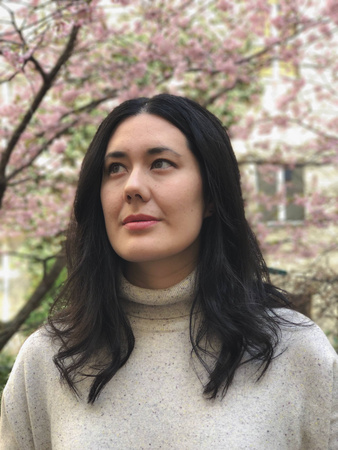 |
|
| Jessica J. Lee (photo: Ricardo A. Rivas) |
|
Jessica J. Lee's diverse background--her mother is Taiwanese, her father Welsh; and both transplanted to Canada, where Lee was born--has provided rich, fertile inspiration for her previous adult nonfiction titles--Turning; Two Trees Make a Forest; Dispersals. Lee makes her children's debut with A Garden Called Home (Tundra, $18.99), illustrated by fellow Canadian Elaine Chen. The vibrant picture book features a girl who travels with her mother to visit faraway family in their warm, verdant home, where she learns valuable, tasty lessons about plants, trees, landscapes, and relationships. When the pair return home where frigid temperatures trap sad Mama inside, the resourceful girl figures out how to coax her mother outdoors to discover the wonders of their local natural world.
After your award-winning titles for adults, what made you write a children's picture book? And was there a specific motivation for creating A Garden Called Home?
I've always wanted to write for children--probably even before I began writing for adults. It wasn't until I'd written my second book, Two Trees Make a Forest, that the idea for A Garden took shape. Two Trees had done really well and the team at Tundra asked if I'd ever tried writing for children, and I basically leapt out of my chair with excitement.
I took as a starting point an idea that I'd touched upon in Two Trees--that pine tree roots help restore integrity to mountainsides after landslides and are often used in regeneration. And I thought: How could this thematically become a story?
How different was writing for children versus writing for older readers?
In some ways, I found the writing process quite similar, while in others it was markedly different. I think this book has "big" themes, the kinds of themes that I'd write into any of my adult books--like intergenerational knowledge and loss, the longing created in migration, a lot of plant and environment knowledge, too. But then the voice is so distinctly different: in my nature writing I am myself; the voice is instinctive.
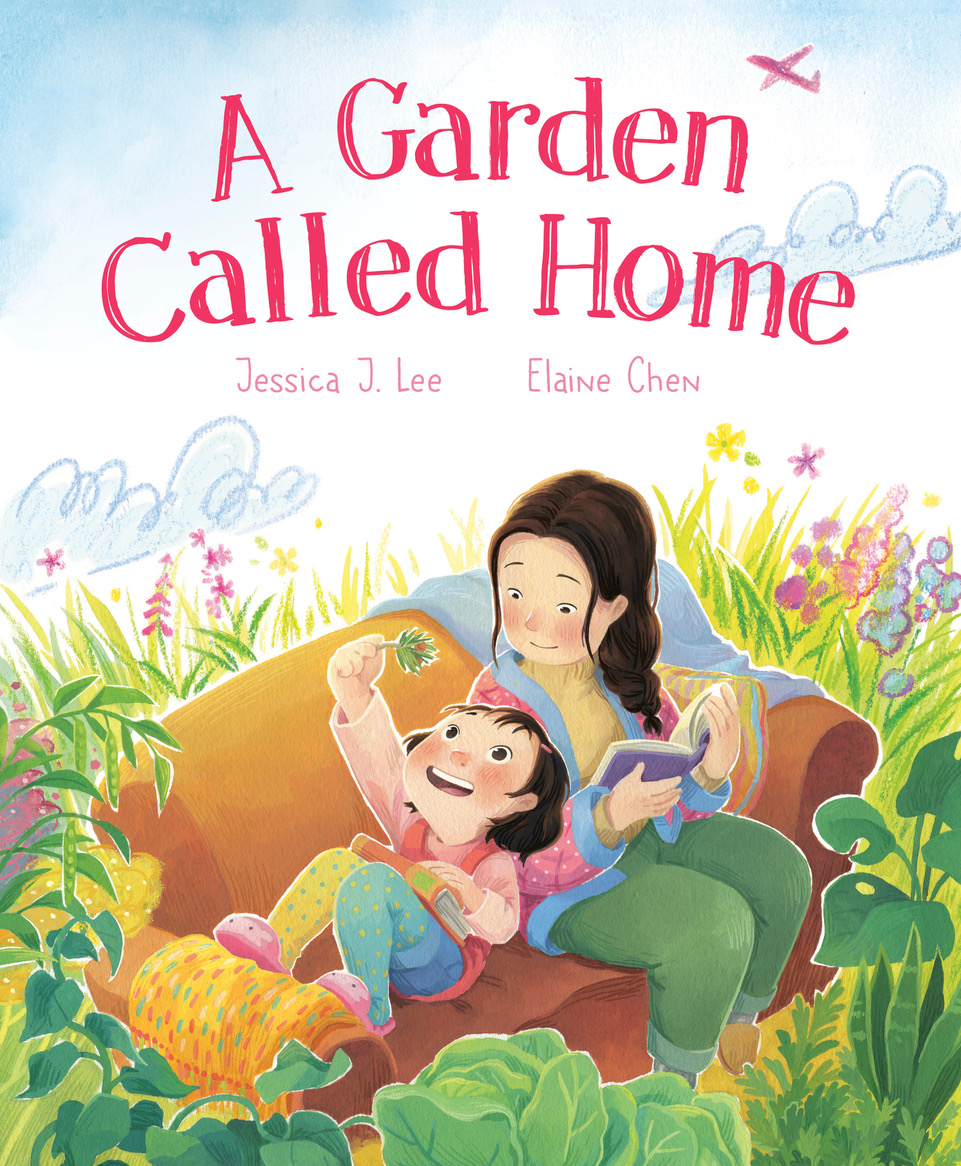 For this story, I had to tap into the voice of a child again--I drew a lot on my own childhood to imagine some of this book, but it's fictional, so I had to search for the little girl's voice. I was much more timid in nature than she is! I thought a lot about giving her resilience and thoughtfulness and threw myself into "being" her voice on the page.
For this story, I had to tap into the voice of a child again--I drew a lot on my own childhood to imagine some of this book, but it's fictional, so I had to search for the little girl's voice. I was much more timid in nature than she is! I thought a lot about giving her resilience and thoughtfulness and threw myself into "being" her voice on the page.
As with your earlier books, the natural world infuses Garden. What draws you to continuously write about nature?
I come back to the natural world as a subject partly because of my training in environmental history but mostly for aesthetic reasons. I really want to spend my time with things that move me: natural beauty, of course, but also the high-stakes feeling that we need to document and bear witness to our world under threat. Nature feels magnetic for me. Also, I didn't really start life out in an outdoorsy way--so for me a lot of my writing has been a way of asking, "What might this look like, to really engage with the natural world?"
I realize authors and artists are usually paired by the publisher. What were your interactions like with your illustrator, Elaine Chen? Did you have images in mind before she began her work?
I feel so lucky I got to work with Elaine on this! Tundra was brilliant in that they let me suggest who I wanted to illustrate, and Elaine had worked with a friend of mine, Sennah Yee, on two books [Lin's Lucky Red Envelope; My Day with Gong Gong]. I was so drawn to the joyfulness of her illustrations, so she felt a natural choice. When it came to specific imagery, what amazed me was that, though I'd only left a few very minor notes on illustrations in the manuscript, Elaine's first sketches were basically exactly what was in my brain while I was writing. The first spread, in the living room of the family's home, is literally magicked out of my head. I don't know how she did it! I loved seeing those early sketches become these bouncy, vibrantly colored spreads, and the tiny details: the foods on the table, the neighbors peering over the fence! The endpapers were just a bonus: when I saw that the plants begin as seedlings and "grow" into mature plants at the end, I was completely smitten.
Elaine superbly captures the nurturing mother/daughter relationship in Garden. Have you shared this lovely book with your own mother?
I had some early mock-ups of the book in the winter of 2022, when my mom came to stay with me when my own baby was due. I have this vivid memory of me at 42 weeks pregnant, absolutely giant, sitting with my mom and showing her this story, trying to imagine what it would be like to read it with my own daughter. While the book is fictional, the idea of the mother hating winter is taken from my life--my mom HATES the cold. And she misses Taiwan so much. I think the resonance came across to her, or at least I hope.
Now as a new mother, what are the most important lessons you'd like to impart to your daughter about her co-existence on Earth?
Oh, this is a big question! When I was writing the book, I hesitated a little bit about the mother's sadness, the idea that her daughter would somehow help turn things around. Because that felt like too much pressure to put on a child. But when I realized it was more about finding shared joy, about reaching out into the wider world and forging connections, rather than turning inward, the story clicked. I suppose that's the lesson: look at the world around you--and the people, too--with not just compassion but curiosity. Reach out and make community, whether with those closest to you or those newer. It's a book, really, about connection.
You have two books coming out a month apart, albeit targeting quite different audiences. Your adult title Dispersals is out March 12. What inspired this collection?
I wrote the book--actually both these books--during a really turbulent period. And it was turbulent for everyone, between 2020 and 2022, as we know. The essays began as a column while I was still in Berlin, and then the book idea--writing about plants out of place had been lingering since Two Trees--came together while I was in London. When [the pandemic shutdown] started in 2020, I entered a period of life that was unpredictable, despite my trying to hold tight, to set down roots. The whole book became even more about feeling displaced and unmoored. While my own migration history, and that of my family, was always going to be in the book, I really thought I would be writing it from a stable standpoint, from a single, settled home. I was pregnant and trying to finish it before the baby arrived--but of course I didn't! We had to move again. So, this idea that I'd be writing about all these migrations in the past tense just became impossible. I had to write this book while we were still searching for a home. The last essay, which was originally planned to be a meditation on raising a child in England, doubled in size, became something entirely unplanned--because it had to.
What might you be writing next?
Strangely, I feel like I've come somewhat full circle. There are always lingering questions after a project, and it's just a question of when I'm ready to touch them again. I'm currently writing about freshwaters! After my first book, Turning, I spent time as writer-in-residence at a freshwater ecology lab, so I'm finally getting back to that, thinking about water and biodiversity (and swimming) again. Exactly what the shape of it will be, I'm not yet sure. But I'm puzzling it out. --Terry Hong
Book Candy
Book Candy
"And the Oscar for best imaginary book in a movie goes to... a surprisingly literary year in film," the Washington Post reported.
---
"Sorry, Web scholars: reading print is better for comprehension," Mental Floss noted.
---
Letters of Note shared an excerpt in which Ernest Hemingway's mother expressed her disgust with The Sun Also Rises.
Discover Great Publishers
Celebrating Women's Stories with Sourcebooks
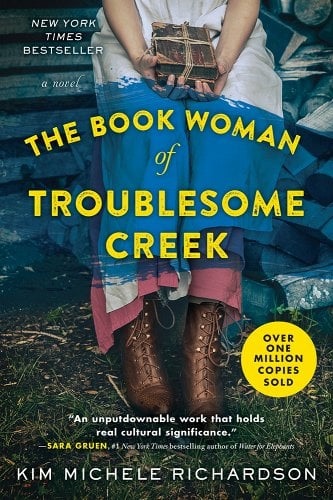 The Book Woman of Troublesome Creek: A Novel by Kim Michele Richardson (Sourcebooks Landmark, $16.99, 9781492671527), first published in 2019, has sold more than a million copies, was a PBS Book Pick and recommended by Dolly Parton.
The Book Woman of Troublesome Creek: A Novel by Kim Michele Richardson (Sourcebooks Landmark, $16.99, 9781492671527), first published in 2019, has sold more than a million copies, was a PBS Book Pick and recommended by Dolly Parton.
The hardscrabble folks of Troublesome Creek have to scrape for everything--everything except books, that is. Thanks to Roosevelt's Kentucky Pack Horse Library Project, Troublesome's got its very own traveling librarian, Cussy Mary Carter.
Cussy's not only a book woman, however, she's also the last of her kind, her skin a shade of blue unlike most anyone else. Not everyone is keen on Cussy's family or the Library Project, and a Blue is often blamed for any whiff of trouble. If Cussy wants to bring the joy of books to the hill folks, she's going to have to confront prejudice as old as the Appalachias and suspicion as deep as the holler.
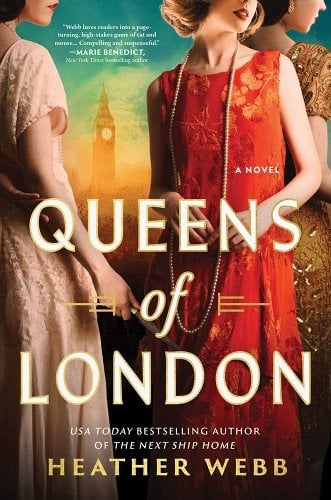 If you loved The Book Woman of Troublesome Creek, you'll love Queens of London: A Novel by Heather Webb (Sourcebooks Landmark, $34.99, 9781728282947), published February 6, 2024.
If you loved The Book Woman of Troublesome Creek, you'll love Queens of London: A Novel by Heather Webb (Sourcebooks Landmark, $34.99, 9781728282947), published February 6, 2024.
1925. London. When Alice Diamond, AKA "Diamond Annie," is elected the Queen of the Forty Elephants, she's determined to take the all-girl gang to new heights. She's ambitious, tough as nails, and a brilliant mastermind, with a plan to create a dynasty the likes of which no one has ever seen. Alice demands absolute loyalty from her "family"--it's how she's always kept the cops in line. Too bad she's now the target for one of Britain's first female policewomen.
Officer Lilian Wyles isn't merely one of the first female detectives at Scotland Yard, she's one of the best detectives on the force. Even so, she'll have to win a big score to prove herself, to break free from the "women's work" she's been assigned. When she hears about the large-scale heist in the works to fund Alice's new dynasty, she realizes she has the chance she's been looking for--and the added bonus of putting Diamond Annie out of business permanently.
A tale of dark glamour and sisterhood, Queens of London is a look at Britain's first female crime syndicate, the ever-shifting meaning of justice and the way women claim their power by any means necessary.
If You Loved Clytemnestra, You'll Love Neferura
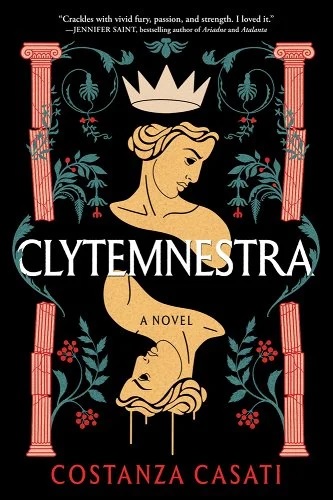 Clytemnestra: A Novel by Costanza Casati (Sourcebooks Landmark, $16.99, 9781728279374), first published in 2023, was recently released in paperback. It won Goodreads' Buzziest Debuts of 2023 and POPSUGAR's Best Historical Fiction of 2023. A blazing novel set in the world of Ancient Greece, this is a thrilling tale of power and prophecies, of hatred, love and of an unforgettable Queen who fiercely dealt out death to those who wronged her.
Clytemnestra: A Novel by Costanza Casati (Sourcebooks Landmark, $16.99, 9781728279374), first published in 2023, was recently released in paperback. It won Goodreads' Buzziest Debuts of 2023 and POPSUGAR's Best Historical Fiction of 2023. A blazing novel set in the world of Ancient Greece, this is a thrilling tale of power and prophecies, of hatred, love and of an unforgettable Queen who fiercely dealt out death to those who wronged her.
You were born to a king, but you marry a tyrant. You stand by helplessly as he sacrifices your child to placate the gods. You watch him wage war on a foreign shore and you comfort yourself with violent thoughts of your own. Because this was not the first offense against you. This was not the life you ever deserved. And this will not be your undoing. Slowly, you plot.
But when your husband returns in triumph, you become a woman with a choice. Acceptance or vengeance, infamy follows both. So, you bide your time and force the gods' hands in the game of retribution. For you understood something long ago that the others never did. If power isn't given to you, you have to take it for yourself.
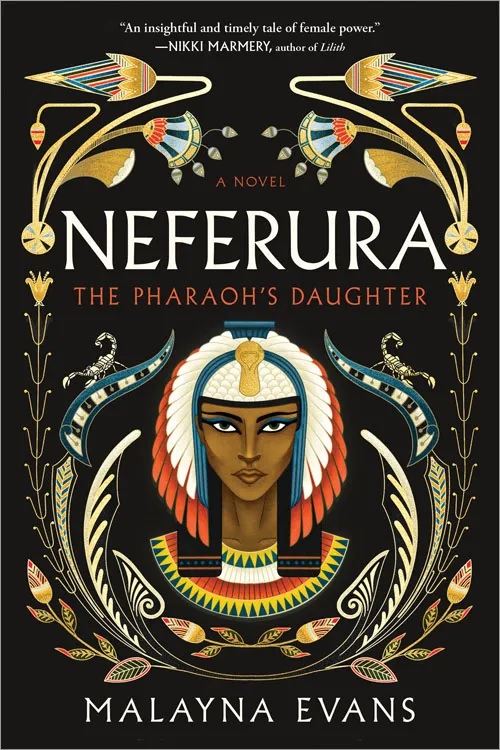 If you loved Clytemnestra, you'll love Neferura: A Novel by Malayna Evans (Sourcebooks Landmark, $16.99, 9781728278728). Published February 13, 2024, this is the thrilling tale of the forgotten daughter of a legendary Egyptian pharaoh and the path she must take to escape her own dangerous fate.
If you loved Clytemnestra, you'll love Neferura: A Novel by Malayna Evans (Sourcebooks Landmark, $16.99, 9781728278728). Published February 13, 2024, this is the thrilling tale of the forgotten daughter of a legendary Egyptian pharaoh and the path she must take to escape her own dangerous fate.
Neferura, princess and high priestess of Kemet, knows her duty is to her people. When your mother is the great Pharaoh, it is hard to forget. But Neferura's unique position at court comes with high stakes for her country, especially when she's forced to serve her vile half-brother, a man determined to stop Neferura's potential rise.
Peace, it seems, never lasts for women who wield power in the open. Especially when they cross a vengeful man.
When Neferura overhears Thutmose's plot to end her mother's rule, she knows he must be stopped, no matter the cost. The discovery of a mysterious tattooed wisewoman and her shadowy network of spies offers an uneasy alliance. But the wisewoman wields more power than Neferura knew possible--power with the potential to rival her own. Neferura must decide where her loyalties lie and how much she's willing to sacrifice to protect the people she loves before everything crumbles at the hands of a tyrant.
Rediscover
Rediscover: A Gentleman in Moscow
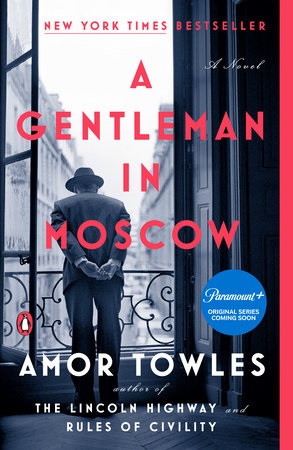 A television adaptation of Amor Towles's 2016 novel, A Gentleman in Moscow, is set to premiere on Paramount+ later this month. The story follows Russian aristocrat Alexander Ilyich Rostov, sentenced to permanent house arrest in Moscow's Hotel Metropol after the 1917 Bolshevik revolution. As the years of his confinement pass, Count Rostov befriends hotel staff and guests and even becomes caretaker for a young girl whose parents disappear in Siberia. The Count's personal history and the hotel's many foreign guests allow him to reflect on pivotal moments of the Cold War and the complexities of life under Soviet rule. Towles's novel, his second after Rules of Civility (2011), was a finalist for the 2016 Kirkus Prize in Fiction & Literature and received positive reviews for its combination of charm and philosophical depth. It has sold more than two million copies.
A television adaptation of Amor Towles's 2016 novel, A Gentleman in Moscow, is set to premiere on Paramount+ later this month. The story follows Russian aristocrat Alexander Ilyich Rostov, sentenced to permanent house arrest in Moscow's Hotel Metropol after the 1917 Bolshevik revolution. As the years of his confinement pass, Count Rostov befriends hotel staff and guests and even becomes caretaker for a young girl whose parents disappear in Siberia. The Count's personal history and the hotel's many foreign guests allow him to reflect on pivotal moments of the Cold War and the complexities of life under Soviet rule. Towles's novel, his second after Rules of Civility (2011), was a finalist for the 2016 Kirkus Prize in Fiction & Literature and received positive reviews for its combination of charm and philosophical depth. It has sold more than two million copies.
Ewan McGregor stars as Count Rostov in the Paramount+ adaptation. The rest of the cast includes Mary Elizabeth Winstead, Leah Harvey, Johnny Harris, and Paul Ready. Ben Vanstone (All Creatures Great and Small) serves as showrunner and writer. Sam Miller directs the first episode, which premieres on March 29. Towles's most recent book is The Lincoln Highway (2021). A Gentleman in Moscow is available in paperback from Penguin Books ($18). --Tobias Mutter


